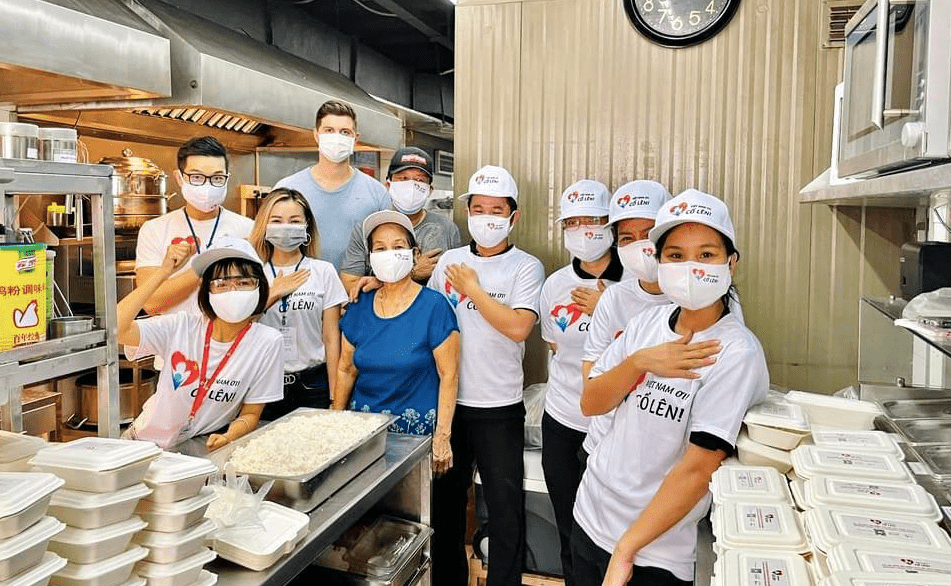Restaurants and coffee shops take measures to re-open after full lockdowns
 |
| Restaurants and coffee shops take measures to re-open after full lockdowns |
Few industries have felt the impact of the coronavirus pandemic more than the restaurant industry. Harry Ang, founder of the Singaporean restaurant chain Lion City, said that the chain has four out of five outlets temporarily shut down during the fourth wave of the pandemic. As a result, the chain saw its revenue plunge by 70 per cent.
While thousands of restaurant businesses have permanently closed, Lion City is among the few that sailed through the COVID-19 storm. The chain has been present in Vietnam for 15 years, targeting the middle and high-end customers. Pursuing the founder's vision to bring the Lion City brand from Vietnam to overseas markets, it tried to keep its first-ever restaurant outlet in Ho Chi Minh City open to revive the brand post-COVID-19.
"We have come so far in 15 years in the restaurant business. We will not give up on our dream to expand Lion City overseas. We do not see the closure of four outlets as failures. Instead, we consider this as challenge and lesson learned," Ang added.
After Vietnam bounces back from social distancing restrictions, Lion City plans to develop a new restaurant named Ok-lah, targeting the affordable segment. Ok-lah will offer healthy and quality products at reasonable prices to consumers. This will help the company to keep up with consumers who are growing more cautious about their spending post-COVID-19.
Ok-lah restaurant will mainly serve takeaways with prices around VND100,000 ($4.42) and below. The restaurant will have a space of 20-50 square metres with a rent of VND15 million ($650).
"We now target people with lower income as many people have lost their jobs and incomes due to the COVID-19 pandemic. This it the main idea behind the new brand: to make things more affordable for everyone with many attractive promotions," Ang said.
Likewise, many coffee shop chains had to close shops to reduce rental prices. After Vietnam eased social distancing measures in October, Starbucks has announced the closure of its outlet in the Rex Hotel in Nguyen Hue Street in Ho Chi Minh City after four months of closing. Meanwhile, Starbucks has increasingly connected with online food delivery platforms such as GrabFood and ShopeeFood to serve takeaways to customers. With Ho Chi Minh City being the epicentre of the fourth wave of coronavirus cases in Vietnam, Starbucks has rethought how to meet customers' new habits, which favours takeaways and avoids gatherings to curb the coronavirus spread.
Another coffee chain The Coffee House also shut down its flagship coffee shop in Pham Ngoc Thach, District 3. The chain now only operates 140 stores compared to the 180 before the fourth wave.
The representative of Seedcom fund, the owner of The Coffee House said that, "We have identified the bottom line when deciding whether to close or open each store. Our goal is to solve the problem of optimising costs to keep cash flow and ensure operating capacity post-COVID-19."
Other chains such as Trung Nguyen Legend and King Coffee also shared the same fate as they have closed several outlets downtown.
All these closures reflect a new trend of closing ineffective stores and optimising operations among food and beverage (F&B) businesses. Vo Thi Khanh Trang, head of research at Savills Vietnam, said that leasing are the largest expense of F&B businesses, followed by human resources. Another challenge for businesses is to find fully-vaccinated workers. Thus, many F&B businesses have returned premises while retaining key stores to survive the fourth quarter of 2021.
"It is expected that the chains will start expansion in 2022. At this moment, they will need to take time to consider their marketing and business development strategies such as embracing online operations and changing customer services to adapt to the ongoing pandemic," she said.
The latest survey by Vietnam Report reveals that most F&B businesses have become more prudent post-COVID-19, with 78 percent predicting more business difficulties in the remaining months, doubling the rate of 37 per cent one year ago.
However, up to 80 per cent of F&B firms believed that the country will recover quickly after the pandemic. About 47 per cent expect that it will take them about six months to recover, while 33 per cent expect 7-12 months, and 13 per cent more than 12 months.
What the stars mean:
★ Poor ★ ★ Promising ★★★ Good ★★★★ Very good ★★★★★ Exceptional
 Tag:
Tag:
Related Contents
Latest News
More News
- Tet event in Japan celebrates success of 14th National Party Congress (January 25, 2026 | 10:04)
- 14th National Party Congress wraps up with success (January 25, 2026 | 09:49)
- Congratulations from VFF Central Committee's int’l partners to 14th National Party Congress (January 25, 2026 | 09:46)
- List of newly-elected members of 14th Political Bureau announced (January 23, 2026 | 16:27)
- 14th Party Central Committee unanimously elects To Lam as General Secretary (January 23, 2026 | 16:22)
- List of members of 14th Party Central Committee announced (January 23, 2026 | 09:12)
- Highlights of fourth working day of 14th National Party Congress (January 23, 2026 | 09:06)
- Press provides timely, accurate coverage of 14th National Party Congress (January 22, 2026 | 09:49)
- Press release on second working day of 14th National Party Congress (January 22, 2026 | 09:19)
- Minister sets out key directions to promote intrinsic strength of Vietnamese culture (January 22, 2026 | 09:16)






















 Mobile Version
Mobile Version